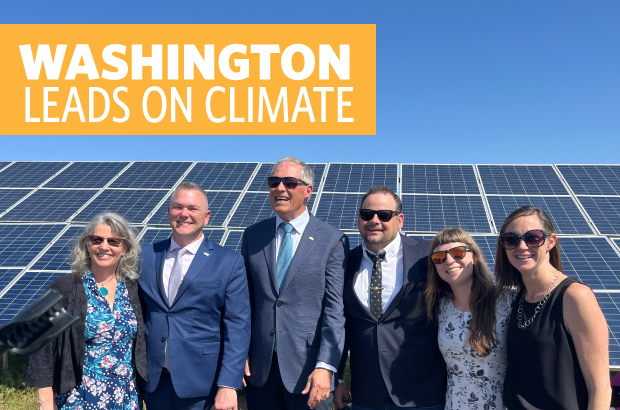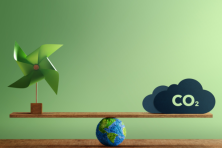On a bright, sunny day last week in Richland, WA, Climate Solutions and other climate advocates joined Governor Jay Inslee at the Horn Rapids Solar Farm, as he signed into law a set of new policies focused on accelerating Washington’s clean energy transition. Among the new laws is HB 1216, designed to help bring more new clean energy projects and associated jobs to the state.
Washington has already established itself as a climate leader, enacting transformative laws like the Clean Energy Transformation Act, the Climate Commitment Act, the Clean Fuel Standard, and the Clean Buildings Act. The state must now shift to implementation of what is understood to be one of the strongest climate policy frameworks in the world. In order to do so, we need to electrify almost all parts of our economy, dramatically expanding the number of clean energy projects in-state and establishing a strong workforce to do so. According to the state’s 2023 Biennial Energy Report, Washington needs to double its supply of clean electricity by 2050 to meet the growing demand for clean electricity—a complex challenge with a short timeframe.
How will HB 1216 help bring more clean energy to Washington?
Building more clean energy projects in Washington requires reducing bottlenecks in our current system that can slow down approval of new projects. HB 1216 will address that problem. At the same time, the new law will maintain crucial safeguards for sensitive ecosystems, species, and resources, build in new opportunities for early and meaningful engagement with Tribes and overburdened communities, and promote the creation of new jobs. Below is a more detailed summary of how this new law will equitably streamline and accelerate Washington’s clean energy transition.
Enhanced Oversight & Coordination
The new law creates an optional coordinated and streamlined permitting process for eligible clean energy projects. For projects that pursue this new process, the Department of Ecology (Ecology) will track timelines and deadlines for various permitting needs, find ways to consolidate permit applications, hearings, and comment periods, and facilitate communication between different parties. This means early and continuous coordination among project applicants, relevant agencies, local jurisdictions, Tribes, and overburdened communities. Additionally, the state budget includes tens of millions in funding for state capacity to ensure that agencies are staffed up and able to execute these numerous new responsibilities, as well as for capacity grants to support Tribes’ consultation and input on a growing number of projects.
Pre-planning to Understand Environmental, Community, and Resource Impacts
The bill also charges Ecology with creating new, statewide environmental assessments of utility-scale solar, utility-scale wind, green electrolytic hydrogen, and related battery storage. These assessments are arguably the most substantial piece coming out of the bill. They will help all parties—Tribes, developers, agencies, overburdened communities, and local jurisdictions—get a better understanding of the potential impacts of new development and options for mitigating any known impacts early and upfront in the planning process, and will result in the creation of maps highlighting these potential impacts.
Consultation and engagement with potentially impacted communities is central to understanding impacts, and is well integrated into the law. Ecology must offer early, meaningful, and individual consultation with any affected Tribes, and must engage with overburdened communities on new clean energy projects. The law also reaches out to rural communities by requiring the state to engage with rural representatives (e.g., vulnerable populations and agriculture, natural resources, and forestry sectors) on potential opportunities and impacts of clean energy development in rural areas.
Adjusting Timelines and Strengthening SEPA Review
With these major investments in coordination, upfront analysis, and pre-planning now in place, the law also implements a reasonable two-year timeline on project-specific environmental impact assessments. It also makes a number of small changes, such as giving project applicants the option to revisit, withdraw, and address impacts in their application if notified they will be required to complete an EIS otherwise, that add up to a more efficient SEPA process.
A comprehensive pathway to our clean energy transition
The need for new clean energy infrastructure has recently been in the spotlight at the national level. A permitting reform bill proposed last fall by Senator Joe Manchin would have streamlined environmental review at the federal level, but it failed to pass, in part because of concerns that it would have stripped away critical opportunities for community input and would clear the way to develop a controversial new fossil gas pipeline. Washington State’s law holds strong on these fronts by weaving in engagement with overburdened communities and consultation with tribes, and by carefully defining what constitutes a “clean energy project” so that only good projects get access to the bill’s benefits.
Ultimately, HB 1216 is the product of tireless work and a commitment to collaboration from the bill sponsors, the Governor, Tribes, labor representatives, utilities, and developers to strike the right balance. Now, as the state turns to implementing Washington’s numerous landmark climate policies, our new siting process can bolster our transition off of fossil fuels. We are confident that this bill will fit right alongside the suite of other climate policies that can serve as a model and encourage other states to pursue similarly collaborative and genuine efforts to tackle clean energy siting challenges.





